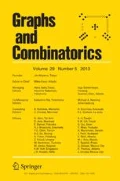Abstract
Given integers \(k\ge 2\), \(n \ge 2\), \(m \ge 2\) and \( a_1,a_2,\ldots ,a_m \in {\mathbb {Z}}{\backslash }{\{0\}}\), and let \(f(z)= \sum _{j=0}^{n}c_jz^j\) be a polynomial of integer coefficients with \(c_n>0\) and \((\sum _{i=1}^ma_i)|f(z)\) for some integer z. For a k-coloring of \([N]=\{1,2,\ldots ,N\}\), we say that there is a monochromatic solution of the equation \(a_1x_1+a_2x_2+\cdots +a_mx_m=f(z)\) if there exist pairwise distinct \(x_1,x_2,\ldots ,x_m\in [N]\) all of the same color such that the equation holds for some \(z\in \mathbb {Z}\). Problems of this type are often referred to as Ramsey-type problems. In this paper, it is shown that if \(a_i>0\) for \(1\le i\le m\), then there exists an integer \(N_0=N(k,m,n)\) such that for \(N\ge N_0\), each k-coloring of [N] contains a monochromatic solution \(x_1,x_2,\ldots ,x_m\) of the equation \(a_1x_1+a_2x_2+ \cdots +a_mx_m= f(z)\). Moreover, if n is odd and there are \(a_i\) and \(a_j\) such that \(a_ia_j<0\) for some \(1 \le i\ne j\le m\), then the assertion holds similarly.
Similar content being viewed by others
References
Bergelson, V.: Ergodic Ramsey theory-an update. In: Pollicott, M., Schmidt, K. (eds.) Ergodic theory of \(Z^d\)-actions: Proceedings of the Warwick Symposium, pp. 1–61. Cambridge University Press, Cambridge (1996)
Croot III, E.S.: On a coloring conjecture about unit fractions. Ann. Math. 157, 545–556 (2003)
Erdős, P., Sárközy, A., Sós, V.T.: On a conjecture of Roth and some related problems I. Algorithms Comb. 8, 47–59 (1989)
Graham, R., Rothschild, B., Spencer, J.: Ramsey Theory, 2nd edn. Wiley, New York (1990)
Khalfalah, A., Szemerédi, E.: On the number of monochromatic solutions of \(x+y=z^2\). Comb. Probab. Comput. 15, 213–227 (2006)
Li, H., Pan, H.: Monochromatic integers adding to polynomials of prime variables. Combinatorica 31, 67–83 (2011)
Sárközy, A.: On difference sets of sequences of integers I. Acta Math. Acad. Sci. Hungar. 31, 125–149 (1978)
Vaughan, R.C.: The Hardy-Littlewood method, 2nd edn. Cambridge University Press (1997)
Vinogradov, I.M.: The method of trigonometrical sums in the theory of numbers, interscience publishers. Translated from the Russian, revised and annotated by K.F. Roth and Anne Davenport (1977)
Acknowledgments
The authors are grateful to the anonymous referees for the insightful comments and efforts to improve the presentation of this manuscript.
Author information
Authors and Affiliations
Corresponding author
Additional information
Supported in part by research grants NSFC and CSC. The last author is also supported by NSFFP.
Rights and permissions
About this article
Cite this article
Cheng, L., Hou, J., Li, Y. et al. Monochromatic Solutions for Multi-Term Unknowns. Graphs and Combinatorics 32, 2275–2293 (2016). https://doi.org/10.1007/s00373-016-1730-y
Received:
Revised:
Published:
Issue Date:
DOI: https://doi.org/10.1007/s00373-016-1730-y


